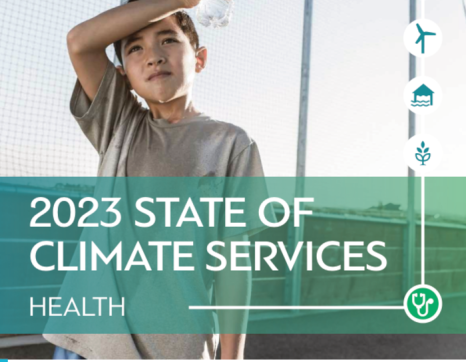
Dengue Early Warning System in Vietnam Showcased at WMO Event
The early warning system for dengue fever in Vietnam, developed by D-MOSS as part of the E4Warning initiative, has been highlighted as a significant success story during the launch of the World Meteorological Organization’s (WMO) “Climate Services for Health” report launched the past 2th November 2023. Rachel Lowe from the Barcelona Supercomputing Center (BSC) represented the project, elaborating on the vital work performed by E4Warning.
The presentation underscored how this advanced system is making strides in public health by providing early warnings of dengue fever outbreaks. By harnessing climate data and predictive modeling, the system is aiding Vietnam in taking preemptive measures to mitigate the impact of this vector-borne disease, thereby safeguarding communities and strengthening the resilience of health systems.
The latest World Meteorological Organization’s (WMO) State of Climate Services report delivers a compelling message about the intricate connection between our changing climate and public health. The report acts as a clarion call, highlighting the dire need for precise climate information and services to bolster the health sector amid escalating threats from extreme weather events, evolving disease patterns, and the looming specter of food and water scarcity.
Prof. Petteri Taalas, WMO Secretary-General, brings to the forefront the widespread occurrence of heatwaves across the globe, further intensified by the imminent onset of El Niño. This scenario sets a backdrop for heightened temperature records, amplifying the urgency for increased investment and collaborative efforts to elevate the role of climate science. By doing so, health partners can gain critical support in times when our climate’s unpredictability takes a tangible toll on human health.
In alignment with Prof. Taalas’s observations, WHO Director-General Dr. Tedros Adhanom Ghebreyesus defines the climate crisis as an escalating health crisis. He underlines the vital need for access to high-quality climate services within the health sector to counteract the perilous effects of climate change on human well-being.
Despite this clear need, the report reveals a gap: climate data often does not permeate health decision-making processes as it should. This disconnect points to an essential requirement for improved early warning systems, especially since disaster events are anticipated to surge, with less-prepared countries facing significantly higher mortality rates.
The focus then shifts to the underestimation of extreme heat’s health impacts. Highlighting the efforts of the Early Warnings for All initiative, the report underscores the necessity to expand heat warning services, which are currently absent in many vulnerable regions.
Ultimately, the WMO report connects the dots between the adverse effects of climate change on various aspects of health — from the quality of the air we breathe to the nutritional security of our food and the control of infectious diseases. It’s a comprehensive wake-up call for cross-sectoral action, aiming to fortify the health community against the multifaceted challenges posed by a warming world. This post serves to emphasize that climate action is not just an environmental imperative but a crucial facet of global health strategy.
Tangible solutions
The World Meteorological Organization’s (WMO) State of Climate Services report doesn’t just outline the challenges; it showcases tangible solutions through success stories where climate services have made significant inroads in health outcomes. One such example is the early warning system for dengue in Vietnam, which was presented as a beacon of the potential benefits of climate services for health. This system, alongside other initiatives from Africa, Europe, the Pacific, and the Pan-American region, represents the strides being made in marrying meteorological insights with health sector needs.
The State of Climate Services report can be downloaded here.
